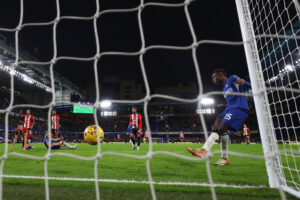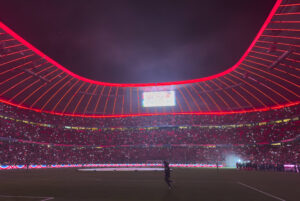In the mid 1990’s, the great Ajax side led by Louis van Gaal swept all before them. At a time when clubs from Italy seemed to dominate Europe, Ajax almost slipped under the radar. They seemed to come from nowhere to lift the Champions League trophy, beating holders AC Milan in the final. That great side had many quality players, many of whom went on to have long careers at the top level. The player who the entire attack was built around, however, never quite matched his Ajax success elsewhere. Jari Litmanen is regarded as the greatest player ever to emerge from Finland, and with good reason.
Early Beginnings
Litmanen was born in Lahti, Finland, in 1971 and joined local club Reipas as a schoolboy. He made his debut at the age of 16, and quickly became one of the first names on the team sheet. Adept at playing in midfield or upfront, he spent four seasons with his home town club. He made his debut for Finland in 1989, just two days after his eighteenth birthday, against Trinidad and Tobago.
In 1990 Litmanen joined Finland’s biggest club, HJK Helsinki. He spent just one season in the capital, scoring 16 times in 27 games before he was on the move again. He joined the now defunct MyPa, where he won his only major trophy in his homeland, the 1992 Finnish Cup. Litmanen’s performance in the final, a 2-0 victory over FF Jaro, was seen by a scout from Ajax. On his recommendation, Louis van Gaal bought the player, who had attracted interest from Barcelona and Leeds United.
Ajax
Jari Litmanen was not an immediate success at the De Meer Stadium, playing the first few months in the reserves. Legendary striker Dennis Bergkamp was Ajax’s main attacker at that time, and impossible to displace. When Bergkamp picked up an injury towards the end of the 1992-93 season, Litmanen was drafted in as his replacement. He gave a good account of himself, playing in the hole behind Swedish striker Stefan Pettersson. Although Bergkamp was immediately restored to the side once fit again, he had been lined up for a transfer to Inter Milan at the end of the season.
Ajax hadn’t won the Eredivisie for three years at the start of the 1993-94 season, but had a great up and coming young team. With Bergkamp gone the side was built around Litmanen, and he responded with 36 goals in all competitions. Ajax were champions, and this heralded a return to the European Cup, by this time known as the Champions League. The home fans had high hopes for this side, with young players like Clarence Seedorf, Edgar Davids and Marc Overmars complementing the experience of Danny Blind and Frank Rijkaard. As good as they were, however, nobody could have predicted just how this side was about to take Europe by storm.
Euopean Domination
Such was the quality that Ajax had coming through their youth team, Pettersson was sold to IFK Göteborg. Teenage forwards Patrick Kluivert and Nwankwo Kanu were promoted to the first team, and made an immediate impact. Litmanen carried on where he had left off the previous season, playing off the main striker, usually Kluivert. Ajax romped to the 1994-95 Eredivisie title, without suffering a single league defeat.
It was in Europe, however, where the Amsterdam club were particularly impressive. Without the benefit of the internet in those days, only an avid follower of Dutch football would know just how good this side were. European champions A.C. Milan had had an indifferent start to their Serie A campaign, with many of their players carrying a hangover from that summer’s World Cup. In spite of this nobody gave Ajax much of a chance when they faced the Italians. Milan were given the shock of their life, the Dutch side winning 2-0 with Litmanen scoring one of the goals.
Ajax comfortably negotiated a group which also included Casino Salzburg and AEK Athens. Milan had already been deducted two points for crowd trouble in their home game with Salzburg. Because of this, their return match with Ajax was switched to Trieste, which gave the Dutch side even more of an impetus. Litmanen was again on the scoresheet, netting after just two minutes of the game to help his side towards another 2-0 victory.
In the quarter-final, Ajax easily saw off Croatian side Hadjuk Split in a 3-0 aggregate victory. The semi-final pitted them against another struggling giant, Bayern Munich. The Bavarian side were having a nightmare of a domestic campaign, with their European form the only bright spot. Unfortunately for the German side, this too was to come crashing down around them. Following a 0-0 draw in Munich, Ajax hammered Bayern 5-2 in the second leg. Litmanen got two of the goals in this game, and some of the attacking football was incredible.
By the time of the 1995 Champions League Final, Milan had recovered some of their better form. Despite the football played by the Dutch side, as holders, Milan were favourites to win in Vienna. Many fans and pundits expected a feast of football, but the game itself was a huge let down. There were very few chances on display, as both team cancelled each other out. The match was settled in the 85th minute when Kluivert, who had been brought on for Litmanen, broke through to score the winner. Ajax were Champions of Europe for the fourth time in their history. Even more impressively, they had beaten the holders three times along the way.
Football Utopia
Ajax saw their squad weakened slightly over the summer of 1995, as Frank Rijkaard retired and Clarence Seedorf was sold to Sampdoria. In spite of this the side carried on regardless, beating everyone who stood in their way. They were still invincible in the Eredivisie, but they seemed to go from strength to strength in Europe.
Their opening Champions League game in 1995-96 saw them beat Real Madrid 1-0 in Amsterdam, but the return fixture in Madrid drew plaudits from all around the world. Not many teams can go to the Santiago Bernabéu and win 2-0, and yet still feel hard done by. Litmanen and Kluivert scored the goals, but Ajax had another two strikes disallowed and hit the woodwork twice. Their performance prompted Real manager Jorge Valdano to claim “they are close to football utopia”
Ajax won the Intercontinental Cup against Brazilian side Grêmio in Japan, proclaiming them as World Champions. They later won the UEFA Super Cup against Real Zaragoza, then holders of the European Cup Winners’ Cup. Litmanen had been so impressive that he finished third in the Ballon d’Or rankings, behind George Weah and Jürgen Klinnsmann.
Unfortunately Ajax’s air of invincibility soon began to decline. Marc Overmars suffered a knee ligament injury in December, which ruled him out for the season and forced him to miss Euro 96. Ajax comfortably retained their league title, but the Champions League was a different story. They suffered a shock home defeat to Panathinaikos, their first European loss in two years, in the semi-final first leg. They reversed it in the second leg, with two goals from Litmanen sealing a 3-0 win in Athens.
The Final was held in Rome’s Olympic Stadium, against Italian champions Juventus. Fabrizio Ravanelli scored the opening goal to give the Turin side the lead. Litmanen equalised shortly before half time following a goalmouth scramble, his 23rd goal of the season. The match finished 1-1, with the Italian side claiming the victory on penalties. Ajax’s short reign as European Champions was over.
End of an Era
The summer of 1996 saw further departures, as Europe’s biggest clubs began to pick apart this great team. Edgar Davids and Michael Reiziger both joined Milan, and Nigerian winger Finidi George joined La Liga side Real Betis. This was also the start of sever injury problems for Jari Litmanen, which would seriously hinder his later career. He only played 16 games in the 1996-97 Eredivisie, and as a result of losing so many players, Ajax finished fourth.
The 1997-98 season saw Litmanen back on top form, scoring 22 goals as Ajax regained their league title. This was in spite of losing Patrick Kluivert to Milan at the start of the campaign. Litmanen spent just one more season in Amsterdam, before it became clear that they could not hold on to their prized asset any longer. The summer of 1999 saw the last remnants of that great Ajax side leave the club. Danny Blind retired, and Litmanen, along with the de Boer twins Frank and Ronald, joined Barcelona. Another departure was goalkeeper Edwin van der Sar to Juventus. It was the end of an era for one of the greatest teams of the 1990’s
Barcelona
Looking back, it seems that van Gaal was trying to recreate his Ajax side at the Nou Camp. In addition to Litmanen and the de Boer brothers, he had already bought Kluivert and Reiziger from Milan the previous summer. Unfortunately for Litmanen, niggling injuries prevented him from ever getting a consistent run in the Barcelona team. He made just 32 appearances in total, scoring four goals.
When van Gaal was sacked at the end of the 1999-2000 season, his replacement Llorenç Serra Ferrer made it clear that Litmanen was not a part of his plans. He did not make a single appearance under the new manager, and was frozen out of the first team altogether. In January 2001, Liverpool manager Gérard Houllier took him to Anfield on a free transfer. Litmanen’s spell at the Nou Camp had lasted just eighteen months.
Liverpool
The move to Anfield should have been a perfect move for both parties, but it just didn’t work out. At the time, Liverpool were going for a unique treble of League Cup, F.A. Cup and UEFA Cup, all of which they won. Unfortunately Litmanen’s persistent injury problems continued, as he broke his wrist playing for Finland. This restricted him to just five appearances in 2000-01. He missed all three of the cup finals Liverpool played that season.
He had more luck the following season, as Liverpool finished second in the Premier League. Litmanen played 32 times and scored seven goals in all competitions, three of them in the Champions League. Despite some sparkling performances, he was often dropped for no apparent reason. Even Houllier’s explanation on why he sold him didn’t make much sense. As he put it, “I let Jari go because I have always believed he had great potential which could benefit other teams. When we had some difficult moments, he was there for us, notably with goals against Fulham, Sunderland, AS Roma and in other crucial games. He had a lack of opportunities in the team but I really liked the reaction of the Ajax players towards Jari when I sold him!”
Return to Ajax and later career
Litmanen received a hero’s welcome when he arrived back in Amsterdam, clearly still a crowd favourite. He played a key part in Ajax’s run to the quarter-finals of the 2002-03 Champions League, but it wasn’t long before his injuries caught up with him once more. After spending much of the 2003-04 season in the treatment room, the club released him from his contract.
Following his release from Ajax, Litmanen joined another club from his hometown, FC Lahti. He later had spells with German outfit Hansa Rostock and Swedish side Malmö FF before returning to the Premier League with Fulham. Litmanen didn’t manage a single game at Craven Cottage, and soon returned to Finland, re-joining Lahti.
He retired from international football in 2010, and remains his country’s all-time leading goalscorer and record appearance holder. It is unfortunate that Finland’s failure to qualify for a major tournament deprived Jari Litmanen of the opportunity to play on the biggest stages of all. He retired from club football in 2011, following a second spell with HJK.
Following his retirement, Litmanen has avoided getting involved in coaching of any kind. He has been employed as a pundit on Finnish TV station YLE, and also regularly writes columns for national newspapers in his homeland.
Final Thought
Jari Litmanen is a hero in his native Finland, and without doubt their greatest ever player. This was recognised when a statue was erected in his honour in 2010, in his hometown of Lahti. It is a shame that injuries robbed him of the chance to fully realise his potential. When he left Ajax in 1999, he could have had his pick of top European clubs. Unfortunately, we’ll never know just how great he could have been.
Previous instalments in the Forgotten Idols series are below:
Part 1: Dejan Savićević Part 2: Stefan Effenberg Part 3: Guiseppe Signori
Part 4: Miguel Ángel Nadal Part 5: Darko Pančev Part 6: Oliver Bierhoff
Part 7: Nuno Gomes Part 8: Mark Hateley Part 9: Andrei Kanchelskis
Main Photo






